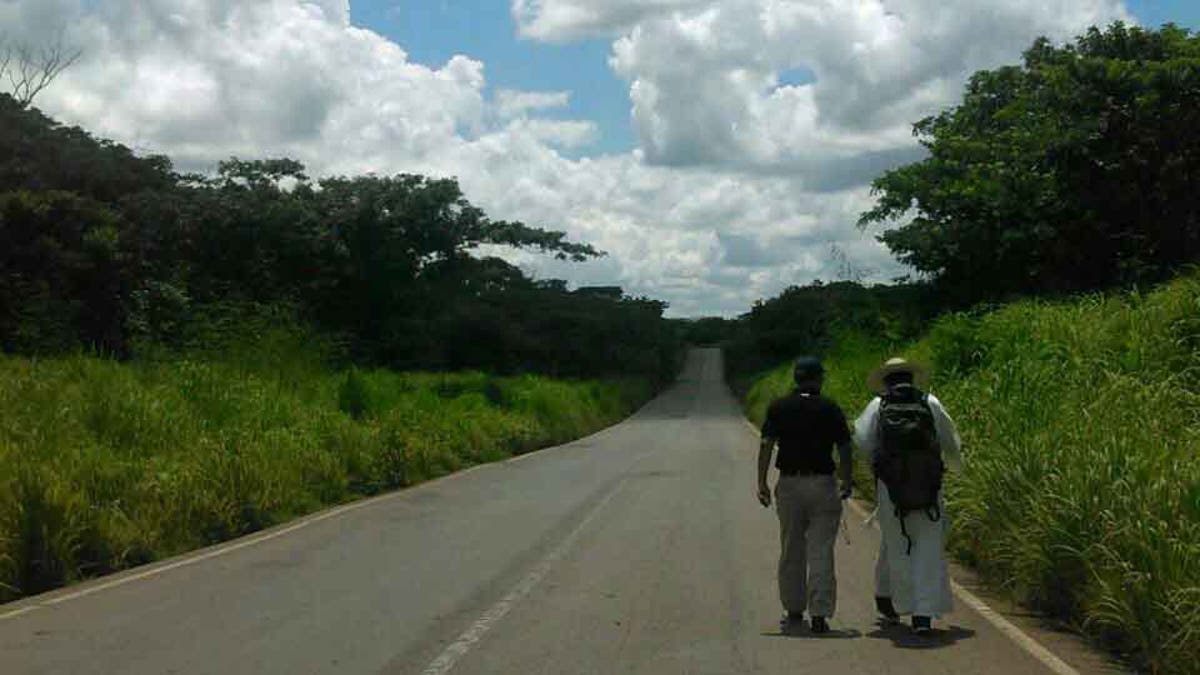
Father Lenin Bastidas started walking last Monday Aug. 22, a 280-mile trek in which he says he will pray for peace in Venezuela. (Josmary Campos)
Caracas, Venezuela – The political mood in Venezuela is starting to heat up as Sept. 1, the day picked for a massive pro-referendum rally, approaches. On that day, the opposition is hoping hundreds of thousands will descend on Caracas to demand a vote to decide whether President Nicolas Maduro should stay in power.
They are calling it “La Toma de Caracas” or “The Caracas Takeover.”
Last week, two separate groups started to walk hundreds of miles from the heartland all the way to the capital city encouraging Venezuelans to join, while Liliana Tintori, wife of jailed opposition leader Leopoldo Lopez, started a set of daily protests throughout the country.
But days before the anticipated event on Sept. 1st, violence is already a concern. Government supporters are allegedly trying to boycott the different groups rallying, as more and more people seem to spontaneously be joining the initiative and walking to Caracas from their hometowns.
On Saturday, the government issued a decree banning all private aircraft and drones over Venezuelan territory until Sept. 5 — no was explanation given, but many are connecting it to the ongoing rallies.
Tintori has denounced several attacks against her movement, including one on Wednesday last week in the city of Barinas while participating in a press conference with two opposition lawmakers.
“A group self-proclaimed as Chavistas surrounded the hotel in which we were and burned tires. We were trapped for two hours,” she said in a statement.
In Caracas, Carlos Julio Rojas, an activist who works with Jesus Torrealba, secretary of the Democratic Unity Roundtable, was attacked by two government supporters when emerging from the National Assembly.
“They ripped my shirt, hit me different times and broke my glasses. Two police men were watching and didn’t do anything. I had to run to escape,” Rojas told Fox News Latino.
Also last week, student activist Hasler Iglesias said he was threatened in his own Caracas home by members of the armed group Fuerza Bolivariana de Liberación of Chavista affiliation, for organizing political rallies in support of the referendum.
“If you continue with these demonstrations, we will take actions against you (…). We won’t let the opposition burn the country again,” the group wrote on a paper left at his door.
“I think they are trying to scare people to reduce participation in Sept. 1st rally. They want people to think that there could be violence,” Rojas warned FNL.
And many Venezuelans do have that fear right now.
Lenin Bastidas, a Catholic priest from the eastern state of Anzoategui, started walking last Monday Aug. 22 — a 280-mile trek in which he says he will pray for peace in Venezuela.
Bastidas has asked the Episcopal Conference of Venezuela to call for a fasting and prayer vigil in front of the National Electoral Board to try to prevent the September 1st rally from happening.
“I think that something bad could happen that day. I don’t want my Venezuelan people to kill each other while the politicians fight for a seat,” the priest said ahead of his walk.
But even Father Bastidas was targeted by authorities on Friday. Sebin, the Intelligence Police, restrained him for hours in Guarico, in the center of the country, to “check his personal documentation”.
Once released, he announced he will start a hunger strike as soon as he arrives in Caracas to urge the Electoral Board to accept the referendum.
On Wednesday, two separate groups of opposition leaders started to walk hundreds of miles all the way to Caracas, the capital city, where the rally will take place.
One group departed from the state of Amazonas, some 500 miles south of Caracas, while the other started out in Monagas, approximately 300 miles east of the capital.
“We began the activity with 1,500 people and members of indigenous communities have joined in. Now we are at 1,700,” said to Fox News Latino Mauligmer Baloa, an opposition lawmaker from Amazonas.
Amazonas, where at least 50 percent of the population is indigenous, is led by opposition Governor Liborio Guarulla.
“Each protester is carrying a bag with a hammock to sleep in. They have fish to eat and yucuta (an indigenous drink) to hydrate,” Baloa explained.
The walk from Monagas is led by opposition lawmaker Maria Gabriela Hernandez, who is planning stops in different towns to encourage people to participate in the Sept. 1st rally.
“We have to turn into action all the pain and indignation that Venezuela is currently feeling,” Hernandez said.
